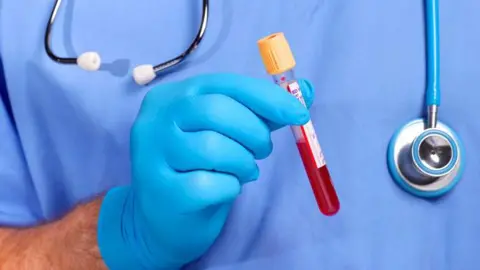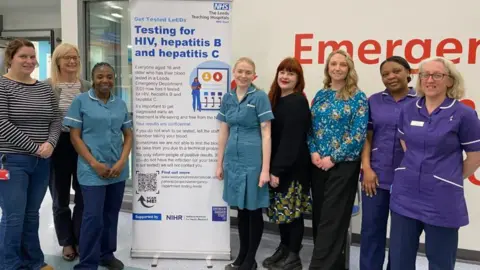Dozens of HIV and hepatitis diagnoses in A&E tests
 Getty Images
Getty ImagesNearly 15,000 patients have been checked for HIV and hepatitis during routine blood tests at two hospitals, according to Leeds Teaching Hospitals NHS Trust.
People aged 16 and over who receive blood tests in A&E at Leeds General Infirmary and St James's University Hospital are now likely to be tested for HIV, hepatitis B and hepatitis C, unless they opt out.
Since the scheme was launched three months ago, six new cases of HIV have been diagnosed, with four further patients identified who were not receiving treatment.
Dr Mark Aldersley, consultant hepatologist, said normalising tests was "so important" to ensure patients were treated early.
Thirty-five new or active cases of hepatitis B and sixteen of hepatitis C were also identified, according to Dr Aldersley.
Hepatitis C can potentially be cured, the NHS said, and treatments for hepatitis B and C can reduce the risk of developing serious illness or complications including cancer.
HIV treatments can suppress the virus, allowing people to live a normal life without passing on the infection.
Dr Emma Page, consultant in virology at the trust, said she hoped routine testing would reach people who may not attend traditional testing services, such as sexual health clinics, and remove a stigma.
 LEEDS TEACHING HOSPITALS
LEEDS TEACHING HOSPITALSDr Aldersley said: "We've been spending the last few years trying to identify more and more people who have hepatitis C and don't know it, testing everybody who's admitted to prison, contacting homeless people who are at higher risk of developing blood-borne viruses.
"If we don't find people early on in the stages of these diseases, they can present much later and they're much sicker, much more difficult to treat."
Leeds healthcare workers are part of a global initiative to end HIV, tuberculosis and viral hepatitis epidemics by 2030.
The project also supports a UK plan to end all new HIV cases by 2030 and eliminate hepatitis C by 2025.
Listen to highlights from West Yorkshire on BBC Sounds, catch up with the latest episode of Look North or tell us a story you think we should be covering here.
